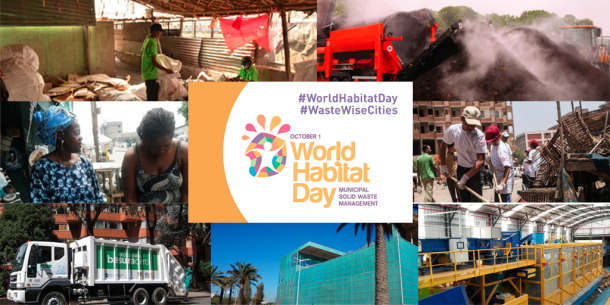 Metropolis
Metropolis
Metropolitan spaces committed to managing solid waste
The United Nations designated the first Monday of October of every year as World Habitat Day. This year’s theme is solid waste management, a complex issue that affects everyone and that is mostly under the management of local and regional governments that operate on metropolitan scales. We seize the opportunity of today’s celebrations to share the cases of Barcelona, Belo Horizonte, Bogotá, Buenos Aires, Cairo, Douala and New Delhi, Metropolis members that are promoting sound waste management across the globe.
The World Bank predicts that, by 2050, the world will be generating 3.40 billion tonnes of waste annually, a drastic increase from today’s 2.01 billion tonnes*. The Sustainable Development Goals (SDGs), the Paris Agreement and the New Urban Agenda mention solid waste management as a key issue to be addressed. Aligned with these global agendas and willing to work towards a more sustainable urban development, governments of major cities and metropolitan spaces are putting in practice innovative methods to ensure the sound management of the waste in urban spaces. Taking into account their local specificities, these governments implement different systems to deal with the complexities of the increased generation of solid waste, which, unless they are managed, have impacts beyond municipal borders, such as the pollution of the air and water sources, breaking cycles of liveability. Here are some of these examples:
Eco-park of the Mediterranean, Barcelona Metropolitan Area (AMB). The Eco-park of the Mediterranean is an integrated treatment facility for municipal waste in the AMB. The project is part of an urban renewal plan developed for the municipality of Sant Adrià de Besòs.
Urban solid waste management in the metropolitan region of Belo Horizonte. An inter-federation model make feasible for the municipalities to manage their waste in an integrated way.
Zero waste program, Bogotá. The Zero Waste Program aims to reduce waste and increase recycling by formalization of the labor force and the introduction of education and training programs for workers and the community.
Recycling center of Buenos Aires. The Buenos Aires Recycling Centre presents an innovative, holistic solution to waste management developed and administered by the city government.
Participatory development programme in urban areas, Cairo. This project advises concepts and methods of participatory community development and grass roots based waste management in informal urban areas.
Innovative service in difficult environment for recycler artisan, Douala. The program increases economic viability, enhances social relevance and guarantees environmental sustainability
Material recovery facility at the New Delhi railway station. The Chintan recycling project at the New Delhi Railway Station manages tons of unsorted garbage every day and enables waste-pickers to carry out their livelihoods in a clean and dignified work environment.
Further information about these cases can be found at the Policy Transfer platform. If you are engaged with urban projects for urban sustainability, we encourage you to register yourself as part of our community and upload your own case studies.

*What a Waste 2.0: A Global Snapshot of Solid Waste Management to 2050, World Bank Group (link)

